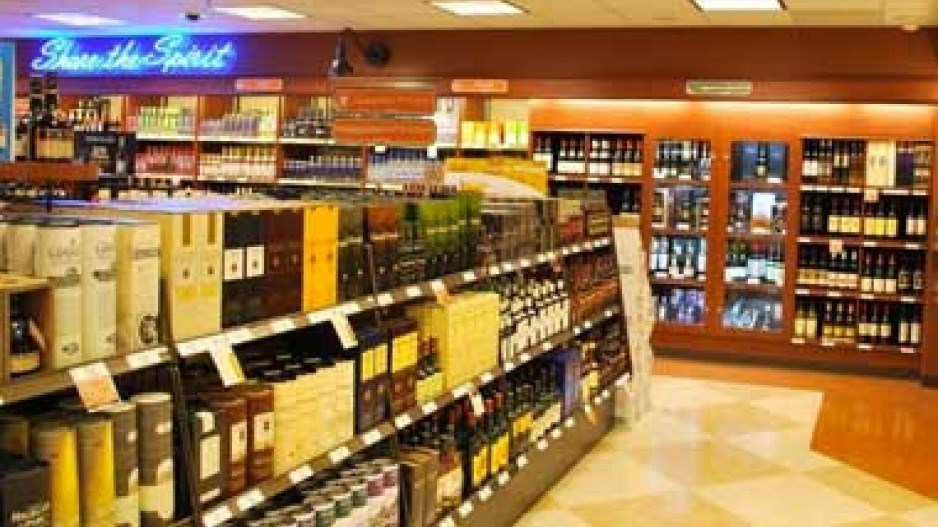Selling the East Vancouver warehouse property occupied by the Liquor Distribution Branch (LDB) could generate more than $30 million for the cash-strapped B.C. government.
But when or if it will be sold is uncertain.
The BC Liberals announced in a February 14 news release – just five days before the provincial budget and 12 weeks before the election – that a request for proposals would be published “in the coming weeks” for a transportation and logistics study to determine a new location. The news release claimed no staff would be affected.
The property at 3150 East Broadway was assessed at $29.77 million, more than $2 million higher than in 2012 and $4 million above its 2011 value.
The 300,000-square-foot warehouse and retail store sits in the Grandview Boundary Industrial Area, near both the Rupert and Renfrew stations on the SkyTrain’s Millennium Line.
Then-finance minister Kevin Falcon announced in the 2012 budget that $700 million of surplus property would be sold. His successor, Mike de Jong, said February 19 that $625 million would be unloaded to balance the 2013-14 budget. A definitive list of the assets was not released, but the LDB land was not mentioned.
“It’s a strong indication of chaos going on in government, generally, and in this ministry in particular,” NDP liquor critic Maurine Karagianis told BIV. “In the current circumstances that seems to be the only way they can present a balanced budget is to claim a lot of asset sales.”
The cost-per-case measurement of the LDB warehouse efficiency is the worst of four benchmark items in the LDB’s new service plan, which contemplates delivering $2.6 billion of profits over the next three years.
A request to interview liquor minister Rich Coleman was not fulfilled.
“We are hoping to find something that is already purpose-built rather than having to wait, but we don’t know what the market is yet,” Coleman told CKNW.
The biggest purpose-built warehouse in the province is ContainerWorld in Richmond, which has a pre-distribution contract with LDB.
ContainerWorld was one of four companies shortlisted last year to privatize LDB’s warehousing and distribution. Tendering was abruptly halted, before the bidders could make final presentations, when the BC Government and Service Employees’ Union scored a new two-year, government-wide deal on September 27, 2012.
“Is this another stealthy way to fulfil the original purpose of offloading some of this to a private sector investor that is closely tied with the government?” Karagianis wondered.
An April 2001 Finance Ministry report by Coriolis Consulting Corp. said the cost of a new facility would likely exceed the revenue from selling the 9.2-acre property. It estimated the government would receive between $13 million and $15 million if the LDB vacated the warehouse or leased it back on a short-term basis.
The cost to acquire a suitable site and build a new distribution centre in South Burnaby, Annacis Island, Northwest Langley or Port Kells was estimated at between $17 million and $19 million. To break even, the new facility would have to be 20% smaller, the report estimated.
“The only relocation options for the LDB in the foreseeable future will be to purchase a site and construct a new building or enter a build-to-suit agreement with a developer,” said the report.
The report added that there was no opportunity to develop “any significant additional space on the site without demolishing all or a portion of the existing building.”
Vacant portions of the East Broadway site are required for on-site circulation, parking and loading. Within six days of the government announcing the ill-fated privatization in the 2012 budget, seven bureaucrats from the LDB, Citizens’ Services and Attorney General and consultants Frank Catala and Jill Leversage began formulating the request for proposals.
Records released via Freedom of Information indicate March 30 was the original target for publishing the RFP, June 1 was the planned proposal submission deadline and June 22 was pencilled in for shortlisting.
The actual RFP was delayed to April 30, and bidders had until June 29 for submissions. They were shortlisted on July 20 in anticipation of a leading bidder being named October 15.
The original RFP was to include LDB “real estate and other assets,” but not the liquor inventory. The April 30 version included no land. •




